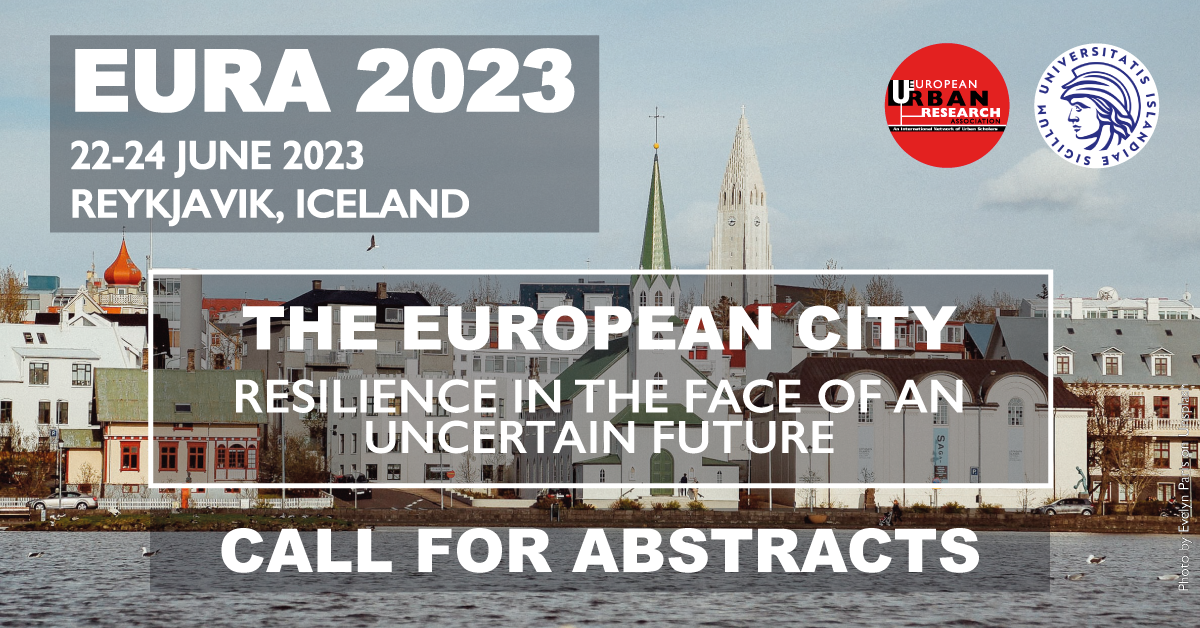«The European City: a practice of resilience in the face of an uncertain future»
22–24 JUNE 2023 – University of Iceland, Reykjavík
European Urban Research Association (EURA) CONFERENCE
The EURA 2023 conference aims to encourage critical reflection on the resilience of the European city in the face of an uncertain future. The last decade has increasingly left us with an growing feeling of uneasiness and uncertainty. Cities have in many areas been key players in tackling climate change, the Covid-19 pandemic and the integration of a large influx of refugees. The conference invites scholars to discuss the resilience of the European city from a broad transdisciplinary perspective.
Reykjavík and Iceland are appropriate contexts within which to explore some of these questions. Although rural at heart, Iceland is a highly urbanized country. However, urbanization has happened swiftly, bringing forth problems in relation to the development of the urban fabric, infrastructure and housing, as well environmental challenges. At the same time, Iceland is an established democracy, and the local government level enjoys both a large number of responsibilities as well as a high level of local self-government.
CALL FOR ABSTRACTS
- Abstracts should be limited to a maximum of 300 words
- Must contain original research work conducted by the author(s)
- Should clearly outline the main argument, scope(s) of the contribution, methodological/ conceptual approaches, and its relevance to the track themes and the core topics of the conference
- Must have a minimum of 3 keywords
- You must choose a conference track to submit your abstract, but you may opt out to choose a specific panel
- Submission deadline: 25 January 2023
During the submission process you will be transferred to a system called easychair. You must log into the system and then submit your abstract. During this process you will be asked to choose a track and preferation of panels. You easychair login will be active for the duration of the conference. You will not be able to change your abstract after submitting it but you will be able to access the information as well as adding a pdf of your paper until shortly before the start of the conference.
CONFERENCE TRACKS
Track 1: The compact, inclusive city
Chairs: Salvör Jónsdóttir (Reykjavík University) & Ólafur Rastrick (University of Iceland)
In recent years, planning authorities far and a wide have embraced the concept of the 15-minute city or 20-minute neighborhood, as a way of framing policies on attractive, socially inclusive, healthy and sustainable communities with active transport and local access to open space, shops and services. Simultaneously we see in face of ever-increasing global mobility and intercultural dynamics a wide ranged interest in exploring the people-place nexus, how people relate to their urban environment and foster a sense of belonging. In this track we explore different aspects of governance, policy instruments, community involvement and policy priorities for the compact, inclusive city.
Track 2: Cities and democracy
Chairs: Grétar Þór Eyþórsson (University of Akureyri) & Jurga Bučaitė-Vilkė (Vytautas Magnus University)
Track 3: The changing composition of cities: managing the urban and regional setting
Chairs: Anna Karlsdóttir (University of Iceland) & Bjorn Egner (Darmstadt University)
Management of the urban setting has always been complex, but global developments and emerging new technologies add further challenges. This track will explore the city as a social realm concerning the provision of affordable housing, efficient use of resources and balancing private and public space. It is devoted to availability, accessibility and affordability of social services to citizens.
Track 4: The smart city
Chairs: Ásdís Hlökk Theódórsdóttir (University of Iceland) & Katarzyna Szmigiel-Rawska (University of Warsaw)
While the pandemics allowed us to appreciate the importance of the places we live in, it also gave us a preview into a future of the smart city, with home working and online shopping and cultural activities. In this track we explore how emerging technologies are changing and shaping cities and urban life with automated and shared mobility, e-commerce and other innovations and how governance and planning of cities can shape the future in the smart city.
Track 5: Managing cities in modern day crises
Chairs: Benjamin Hennig (University of Iceland), Frauke Kraas (University of Cologen) & Harald Sterly (University of Vienna)
This track looks at the concept of “crisis” in relation to urban and regional settings. Covid-19 was a wake-up call as it pointed out the vulnerability of the functions of urban life. People’s lives were seriously disrupted over a long time and in some parts of the world continues to be so. The pandemic not only revealed shortcomings of modern city life but also put the relationship between regions and their urban and rural settings into a new perspective. The refugee crisis following the Ukraine war is further testing the boundaries and capacity of cities.
Track 6: The resilient city
Chairs: Harpa Stefánsdóttir (Agricultural University of Iceland) & Sara Moreno Pires (University of Aveiro)
Read the detailed list of conference panels (pdf)
IMPORTANT DATES
- Submission of Abstracts deadline: 25 January 2023
- Early-bird registration: 15 January 2023 – 1 March 2023
- Regular registration deadline: 1 May 2023


